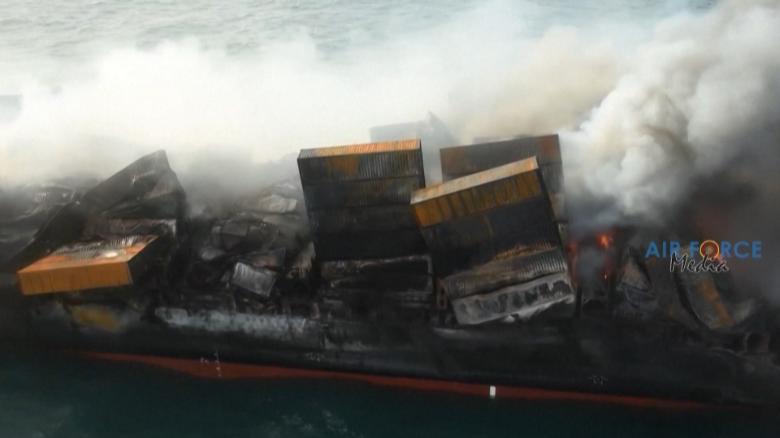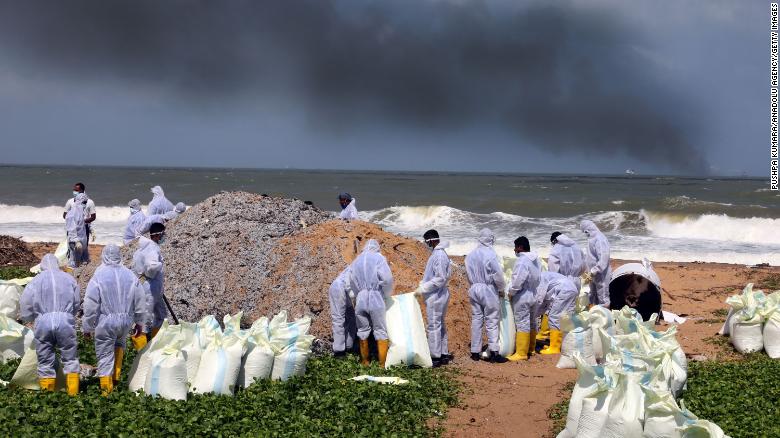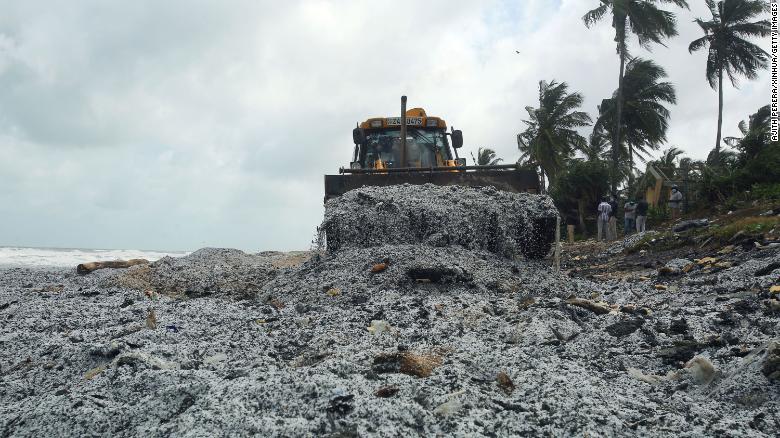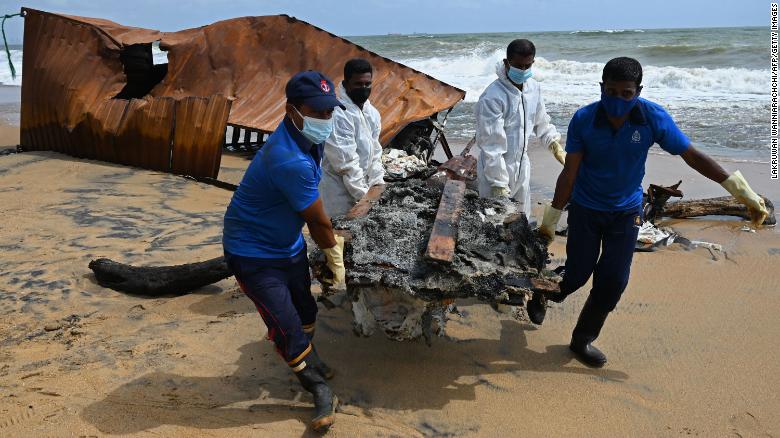By Helen Regan and Sophie Jeong, CNN

(CNN)A huge cleanup operation was underway for a sixth day in Sri Lanka Tuesday after a container ship laden with chemicals caught fire 12 days ago, inundating the country’s western coastline with microplastic pollution and potentially hazardous waste.Sri Lankan environmentalists said it is one of the worst ecological disasters in the country’s history and have warned of a potential threat to marine life and the fishing industry. Members of the Sri Lanka Navy donned protective suits and rubber boots to remove the plastic pellets, chemical waste and debris that have blanketed beaches near the capital Colombo, including the popular tourist spot of Negombo. The Singaporean-registered ship, called the MS X-Press Pearl, was sailing from India’s Gujarat to Colombo when a fire broke out onboard on May 20, as it was nine nautical miles off the Sri Lankan coast. Since then, the Sri Lanka Navy and Indian Coast Guard have been trying to put out the flames and stop the ship from breaking apart or sinking. If that happens, 350 metric tons of oil could leak into the ocean with the potential to cause widespread ecological damage to marine life and affect 30 kilometers (18.6 miles) of coastline between the capital and Negombo, Sri Lanka’s Minister of Fisheries Kanchana Wijesekera said last week. The ship was carrying 1,486 containers when the fire started, 81 of which held “dangerous goods,” including 25 metric tons of nitric acid, according to X-Press Feeders, the operators of the X-Press Pearl. The other chemicals onboard the ship are yet to be confirmed. Sri Lanka Navy personnel remove waste washed ashore from the burning cargo vessel MV X-Press Pearl on the beaches of Wattala to Negombo in the suburbs of Colombo, on May 28.On Monday, the Sri Lanka Ports Authority said the vessel’s hull remained structurally intact and “no oil or chemical spill (had been) observed till now.””Salvors are also exploring the possibility of boarding the ship and making a tow connection so it can be moved,” the port authority said in a statement. X-Press Feeders said on Monday there were “no visible flames aboard the vessel, though smoke is still issuing from areas in the ship’s aft,” according to the company’s Incident Information Center, referring to the area toward the rear of the vessel.”Firefighting tugs will continue spraying and misting operations to ensure the cooling of all hotspots and the vessel’s hull and hatches, with temperature readings being taken with specialized equipment that has arrived from the Netherlands,” it continued. The 25-member crew have been evacuated and most are in quarantine at local hotels. Two crew members sustained leg injuries following an explosion onboard on May 25 and were taken to hospital. One of the pair later tested positive for Covid-19 and was transferred to a special facility in a military hospital, according to X-Press Feeders.
Sri Lanka Navy personnel remove waste washed ashore from the burning cargo vessel MV X-Press Pearl on the beaches of Wattala to Negombo in the suburbs of Colombo, on May 28.On Monday, the Sri Lanka Ports Authority said the vessel’s hull remained structurally intact and “no oil or chemical spill (had been) observed till now.””Salvors are also exploring the possibility of boarding the ship and making a tow connection so it can be moved,” the port authority said in a statement. X-Press Feeders said on Monday there were “no visible flames aboard the vessel, though smoke is still issuing from areas in the ship’s aft,” according to the company’s Incident Information Center, referring to the area toward the rear of the vessel.”Firefighting tugs will continue spraying and misting operations to ensure the cooling of all hotspots and the vessel’s hull and hatches, with temperature readings being taken with specialized equipment that has arrived from the Netherlands,” it continued. The 25-member crew have been evacuated and most are in quarantine at local hotels. Two crew members sustained leg injuries following an explosion onboard on May 25 and were taken to hospital. One of the pair later tested positive for Covid-19 and was transferred to a special facility in a military hospital, according to X-Press Feeders.  An earthmover removes debris from the X-Press Pearl ship, on a beach at Pamunugama in Negombo, Sri Lanka, on May 28.The company said it was “helping local police with their enquiries into the fire and are cooperating with investigators.””X-Press Feeders remain fully focused on the ongoing firefighting and salvage operation and will continue cooperating with the relevant investigations into this incident,” it said. Sri Lankan authorities have launched criminal and civil probes into how the fire started. X-Press Feeders said it was “too early to tell” but had previously reported one of the containers onboard was leaking nitric acid at its previous stops in Hamad Port in Qatar and Hazira Port in India. The company said “the advice given was there were no specialist facilities or expertise immediately available to deal with the leaking unit.”
An earthmover removes debris from the X-Press Pearl ship, on a beach at Pamunugama in Negombo, Sri Lanka, on May 28.The company said it was “helping local police with their enquiries into the fire and are cooperating with investigators.””X-Press Feeders remain fully focused on the ongoing firefighting and salvage operation and will continue cooperating with the relevant investigations into this incident,” it said. Sri Lankan authorities have launched criminal and civil probes into how the fire started. X-Press Feeders said it was “too early to tell” but had previously reported one of the containers onboard was leaking nitric acid at its previous stops in Hamad Port in Qatar and Hazira Port in India. The company said “the advice given was there were no specialist facilities or expertise immediately available to deal with the leaking unit.”
Concerns for fishermen and marine life
The Sri Lankan Marine Environment and Protection Authority (MEPA) said in local media the plastic waste had caused “the worst environmental disaster we have seen in our life time.” MEPA added the damage from the ship was still being calculated. Muditha Katuwawala, coordinator of Sri Lankan environmental group Pearl Protectors, said the ocean surrounding the ship would be “quite toxic” and raised fears for the potential impact on marine life, including several local species of turtles and fish.  Members of the Sri Lanka Navy remove debris washed ashore from the Singapore-registered container ship MV X-Press Pearl.One of the biggest concerns was the millions of plastic pellets that are polluting the waters and washed up on beaches along the coast after an estimated three containers fell into the sea, he said, raising concerns for fish and other wildlife likely to swallow the microparticles.The plastic pellets, or nurdles, are used to make other plastic products and are a big source of ocean plastic pollution. Due to their small size, the pellets can be mistaken for food to birds, fish and other marine wildlife.Katuwawala said another concern is the monsoon rains and wind washing the pellets further along the coast. “Yesterday, and even today, we see how the movement of pellets are polluting all the western coast of Sri Lanka and along the southern coast. This is going to have a severe impact, socially and environmentally,” he said.Researchers were still trying to determine the impact on the environment and marine life, he added. But the fishing industry — of which many Sri Lankans living along the coast rely on for their livelihoods — has already been impacted due to coronavirus restrictions.Wijesekera, the fisheries minister, suspended fishing in the area around the stricken ship and said compensation would be provided to those whose jobs were affected by the disaster. Speaking to CNN last week, Wijesekera said: “We are trying our best to protect the coastline” but if the ship does sink, “we don’t have adequate resources to manage the entire spill.”Even if the ship does not sink, he said it could “take weeks to finish the cleanup.”
Members of the Sri Lanka Navy remove debris washed ashore from the Singapore-registered container ship MV X-Press Pearl.One of the biggest concerns was the millions of plastic pellets that are polluting the waters and washed up on beaches along the coast after an estimated three containers fell into the sea, he said, raising concerns for fish and other wildlife likely to swallow the microparticles.The plastic pellets, or nurdles, are used to make other plastic products and are a big source of ocean plastic pollution. Due to their small size, the pellets can be mistaken for food to birds, fish and other marine wildlife.Katuwawala said another concern is the monsoon rains and wind washing the pellets further along the coast. “Yesterday, and even today, we see how the movement of pellets are polluting all the western coast of Sri Lanka and along the southern coast. This is going to have a severe impact, socially and environmentally,” he said.Researchers were still trying to determine the impact on the environment and marine life, he added. But the fishing industry — of which many Sri Lankans living along the coast rely on for their livelihoods — has already been impacted due to coronavirus restrictions.Wijesekera, the fisheries minister, suspended fishing in the area around the stricken ship and said compensation would be provided to those whose jobs were affected by the disaster. Speaking to CNN last week, Wijesekera said: “We are trying our best to protect the coastline” but if the ship does sink, “we don’t have adequate resources to manage the entire spill.”Even if the ship does not sink, he said it could “take weeks to finish the cleanup.”
CNN’s Angus Watson in Sydney contributed reporting.